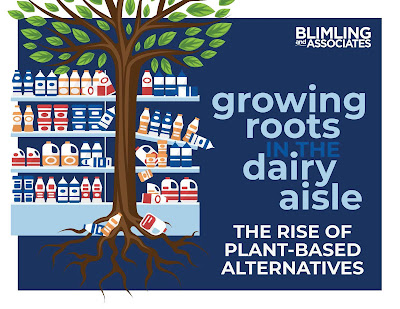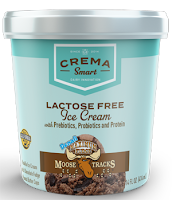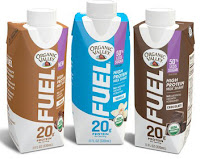To learn more about the category and why it makes sense to include non-dairy in your product portfolio, link HERE to download a copy of “Growing Roots in the Dairy Aisle: The Rise of Plant-Based Alternatives.”
 Check out these recent non-dairy introductions by dairy companies.
Check out these recent non-dairy introductions by dairy companies.Humphry Slocombe, the rebellious and unapologetic San Francisco-based ice creamery known for its unique, ultra-premium creations, has once again joined forces with Top Chef finalist Melissa King and Whole Foods Market to create a new flavor. It also happen to be the brand’s first-ever plant-based pint. After much success with innovative, dairy-free creations offered in its scoop shops, like Perfectly Imperfect Berry Pie, Cherry Elderflower with Dark Chocolate, and Matcha Lingonberry, Humphry Slocombe now has non-dairy Almond Chocolate Crunch.
The pints are available in more than 150 Whole Foods Market stores in the Southern Pacific, Pacific Northwest and Rocky Mountains regions. The specialty flavor is also available in the company’s four Bay Area scoop shops, with pint packages launching for nationwide delivery via Goldbelly.
“This isn’t pretending to be ‘ice cream,’” says Jake Godby, co-founder and chef at Humphry Slocombe. “It’s its own thing and it’s dang good.”
Almond Chocolate Crunch is inspired by an almond butter cup. It is made with creamy almond milk, crunchy candied almonds and flecks of chocolate chips.
DAHlicious Organic, manufacturers of India-style lassi drinkable yogurt and spoonable cup yogurt made with 100% grass-fed organic whole milk, now offers plant-based (almond and cashew) varieties. Flavors include: Alphonso Mango, Field Strawberry, Golden Milk Turmeric, Madagascar Almond, Plain and Wild Blueberry.

Stonyfield Organic has launched Fruit & Veggie Smoothie Pouches, which are made with only six simple ingredients. These dairy-free, no-added sugar pouches are made with 100% real fruits and vegetables and coconut cream. The three varieties are: Berry Cherry Blast (blueberries, cherries, apples and beets), Strawbana Smash (strawberries, bananas, pears and sweet potatoes) and Tropical Twist (mangoes, bananas, pears and carrots).
“With Fruit & Veggie Smoothie Pouches, we’re able to offer not only a nutritious, portable, family-friendly snack, but also cater to different dietary needs and preferences,” says Natalie Levine, brand director. “We recognize what’s important to today’s families, and our new pouches really offer everything--taste, convenience and plant-based--all in one delicious pouch.”
 Canada’s Maison Riviera recently broke its century-long tradition of producing only dairy products with the rollout of premium Coconut Based Yogurt Alternative. The brand entered the U.S. market in five varieties—Lemon, Mango and Passion Fruit, Pineapple and Coconut, Raspberry and Blackcurrant, and Vanilla—which come in two-packs of 4.23-ounce glass jars. While coconut milk is the primary ingredient, the product also contains faba bean and pea protein, and is loaded with one billion probiotic cultures per serving.
Canada’s Maison Riviera recently broke its century-long tradition of producing only dairy products with the rollout of premium Coconut Based Yogurt Alternative. The brand entered the U.S. market in five varieties—Lemon, Mango and Passion Fruit, Pineapple and Coconut, Raspberry and Blackcurrant, and Vanilla—which come in two-packs of 4.23-ounce glass jars. While coconut milk is the primary ingredient, the product also contains faba bean and pea protein, and is loaded with one billion probiotic cultures per serving.Chicago-based Medlee Foods is launching four vegan fat blends to compliment the company’s seasoned butter line. The flavors are Sun-Dried Tomatoes, Roasted Garlic, Lemon Chive and Pesto, and they are packaged just like the butters, in perfectly portioned medallions.
 “While the original Medlee line has developed a strong customer base, retailers have expressed interest in a premium seasoned cooking fat for vegan shoppers, as well as those consumers who avoid or limit dairy intake,” says Alberto Valdes, president and CEO. “There’s nothing like Medlee Seasoned Vegan Blends in the market. They are a convenient way to liven up pastas and vegetables, elevating them to center-of-plate status.”
“While the original Medlee line has developed a strong customer base, retailers have expressed interest in a premium seasoned cooking fat for vegan shoppers, as well as those consumers who avoid or limit dairy intake,” says Alberto Valdes, president and CEO. “There’s nothing like Medlee Seasoned Vegan Blends in the market. They are a convenient way to liven up pastas and vegetables, elevating them to center-of-plate status.”Danone North America is growing its Silk Oat Yeah oatmilk line with a zero grams of sugar option.
 “Silk has the largest unsweetened portfolio of any plant-based beverage brand. In fact, consumer interest in options with zero grams of sugar has doubled in 2019,” says Travis Hayes, brand manager for Silk. “By introducing an oatmilk with zero grams of sugar, we continue to bring innovative options to meet ever-evolving consumer preferences.”
“Silk has the largest unsweetened portfolio of any plant-based beverage brand. In fact, consumer interest in options with zero grams of sugar has doubled in 2019,” says Travis Hayes, brand manager for Silk. “By introducing an oatmilk with zero grams of sugar, we continue to bring innovative options to meet ever-evolving consumer preferences.”This past summer, Danone expanded the Silk Oat Yeah brand into the yogurt alternative space. The spoonable cup product combines gluten-free oats with live and active cultures. It comes in four varieties: Mango, Mixed Berry, Strawberry and Vanilla.
And, be on the lookout for the company’s gut-healthy brand Activia to enter the plant-based space in 2020.
In July 2018, Dean Foods Company became a majority stakeholder in Good Karma Foods, a flaxseed-based milk and yogurt alternative brand. Ralph Scozzafava, CEO of Dean Foods at the time, said, “Good Karma is a fast-growing brand that gets us back into the growing plant-based food and beverage category, making it an excellent addition to our portfolio.”
While Dean Foods remains a majority stakeholder in Good Karma Foods, the company has become a voice for protecting use of the word milk and other dairy terms. “We believe it is wrong that many plant-based products are currently marketed using milk’s good name yet are lacking several of the inherent nutrients of their dairy counterparts,” Dean Foods said in a statement. The company grew frustrated with the International Dairy Foods Association over the trade group’s unwillingness to oppose labeling plant-based products with dairy terms and a few weeks ago decided to end its membership with the group.
In the meantime, Good Karma continues to grow its offerings, which sport phrases such as “plant-based sour cream,” “dairy-free yogurt” and “plant-based milk alternative” on packaging. For the holidays, the brand is offering a line of nogs and dips.
Baskin-Robbins, the world’s largest chain of ice cream specialty shops, is dipping into the plant-based dessert category with the launch of Non-Dairy Chocolate Chip Cookie Dough and Non-Dairy Chocolate Extreme. The vegan products are made with a base blend of coconut oil and almond butter.
 “The Baskin-Robbins culinary team has been hard at work on our non-dairy flavors for over two years. It was important for us to take the time to get it right,” says Jeanne Bolger, director of research and development. “Both flavors are so smooth and indulgent, and the final product delivers the incredible quality that our customers have come to expect from any Baskin-Robbins ice cream.”
“The Baskin-Robbins culinary team has been hard at work on our non-dairy flavors for over two years. It was important for us to take the time to get it right,” says Jeanne Bolger, director of research and development. “Both flavors are so smooth and indulgent, and the final product delivers the incredible quality that our customers have come to expect from any Baskin-Robbins ice cream.”Ben & Jerry’s, a Unilever brand, continues to grow its dairy-free frozen dessert pints lineup. There are currently 12 offerings, which represent almost 25% of the company’s full-time flavors.
Chobani is getting into the plant-based category with new Non-Dairy Chobani. It is a cultured organic coconut product void of lactose and containing 25% less sugar than many non-dairy options in the marketplace. The line includes both cup and drinkable products, another differentiator in this growing space.

The Non-Dairy Chobani name and packaging represents Chobani’s advocacy for transparency as it pertains to better aligning food standards of identity. The company is taking a leadership role in advocating for transparency to make a clear distinction between milk-based foods and non-dairy options. Chobani believes consumers are more empowered when food companies accurately describe foods and the nutritional benefits they offer.
The Häagen-Dazs ice cream brand of Nestle has an extensive collection of non-dairy frozen desserts, including pints and novelties. One of the brand’s most recent introductions is in the new Spirits Collection, which rolled out to the U.S. marketplace in early 2019. The non-dairy variety is Amaretto Black Cherry Almond Toffee.
Hudsonville Ice Cream has been making traditional dairy ice cream with the same base recipe since 1926. The company’s new dairy-free pint line is made with a blend of oat milk and coconut cream. After more than two years of recipe development and tasting, the line rolled out in seven flavors: Birthday Cake, Caramel Cookie Dough, Cherry Fudge, Chocolate, Mint Fudge Cookie, Peanut Butter Truffle and S’mores.
Perry’s is on board, too. Since 1932 the family-owned dairy has been churning real dairy ice cream. The company decided to get into the plant-based space with new Perry’s Oats Cream. What’s key to note with Perry’s first oat-based, dairy-free frozen dessert is that it’s being positioned as another great Perry’s product, not a dairy alternative. The company is not even bothering with the basic vanilla and chocolate. Perry’s Oats Cream features seven decadent flavors: Apple Strudel, Blueberry Pancake, Coconut Caramel, Oat Latte, Peanut Butter Coffee Cake, Peanut Butter & Cookies and Snickerdoodle. The vegan lineup is a good source of fiber (a nutrient of concern in the U.S. diet) and made with whole grains.
“As a market leader with extensive dairy expertise, we recognized a growing need to bring to market a great-tasting, plant-based frozen dessert,” says Robert Denning, president and CEO of Perry’s. “Consumers look to their trusted ice cream brands to create quality dairy-free options. We certainly believe our team of talented research and development experts hit it out of the park with a full line of these amazing tasting oat-based, dairy-free products.”
The pint packaging features a natural oat tone inscribed with a brand message stating, “ice cream hasn’t been for everyone…until now. Meet Perry’s Oats Cream.”
And that's why dairies are smart to offer non-dairy options.

















































